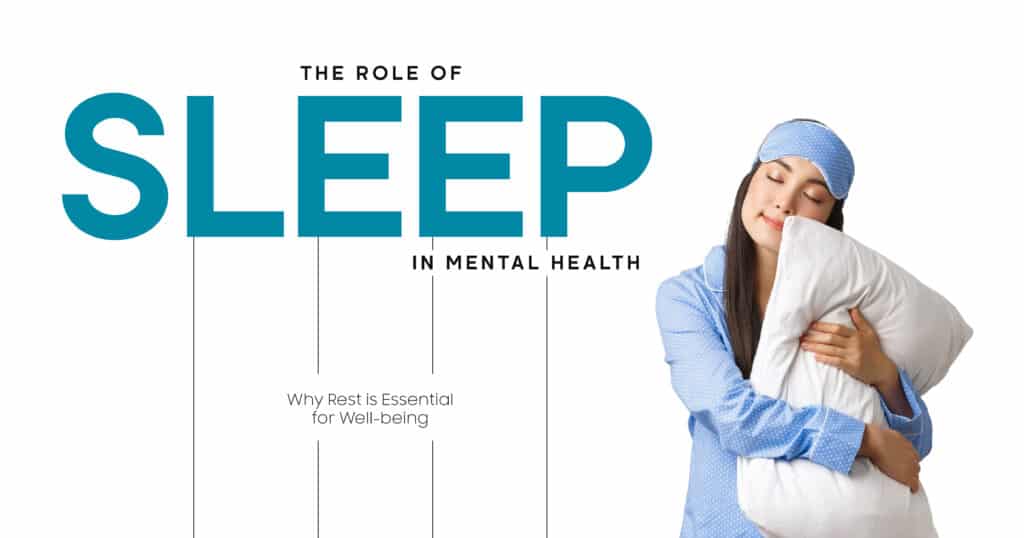When you think of maintaining good mental health, consider therapy, exercise, or even diet. But have you ever considered how crucial sleep is in this equation? Sleep isn’t just about feeling rested; it’s deeply intertwined with your mental well-being.
Essential Takeaways
- Sleep Impacts Mental Health: Quality sleep is crucial for mental well-being, affecting mood, cognitive function, and stress levels.
- Improvement Strategies: Establish a consistent sleep routine, optimize your sleep environment, and manage stress to enhance sleep quality.
- Seek Professional Help if Needed: Persistent sleep issues may require professional evaluation and treatment to address underlying problems and improve overall health.
In this blog post, we’ll explore why sleep is essential for mental health, how it affects your brain, and how you can improve your sleep quality. So, grab a comfy blanket and let’s dive into the world of sleep!
California Mental Health
Understanding Sleep and Mental Health
How Sleep Affects the Brain
Sleep is like a reboot for your brain. Each night, your brain goes through several stages of sleep, including REM (Rapid Eye Movement) and non-REM stages. These stages are essential for different brain functions.
The Stages of Sleep
- Light Sleep (Stage 1 and 2): This is the transition phase between wakefulness and sleep. It’s relatively easy to wake up during this stage, and it helps your body relax and prepare for deeper sleep.
- Deep Sleep (Stage 3 and 4): Often called slow-wave sleep, this stage is crucial for physical restoration. It’s during deep sleep that your body repairs muscles and tissues, and your immune system strengthens.
- REM Sleep: This is the stage where most dreaming occurs. REM sleep is important for emotional regulation and memory consolidation. It helps you process experiences and emotions, contributing to cognitive functions like learning and problem-solving.
Sleep Cycles and Brain Function
A complete sleep cycle lasts about 90 minutes and includes all these stages. You go through several sleep cycles throughout the night, each serving different purposes. For example, the first half of the night typically includes more deep sleep, while the latter half has more REM sleep.
These cycles influence your cognitive processes, like attention and memory. If you’re constantly waking up during these cycles, you might not get the full restorative benefits of sleep, leading to concentration and emotional stability issues.
The Impact of Sleep on Mental Health
Sleep and Mood Disorders
The connection between sleep and mood is well-established. Poor sleep or sleep disorders can exacerbate mental health conditions like depression and anxiety. For instance:
- Depression: Research shows that people with depression often experience disrupted sleep patterns. This can create a vicious cycle where poor sleep worsens depression, and depression makes it harder to sleep.
- Anxiety: Anxiety can make it difficult to fall asleep and stay asleep. High levels of stress and worry can keep your mind racing, making restful sleep elusive.
Cognitive Function and Sleep
Sleep isn’t just about rest; it’s crucial for cognitive functions. Lack of sleep can impair:
- Memory: Both short-term and long-term memory rely on quality sleep for consolidation. With it, you may be able to remember important information or make decisions.
- Concentration: If you’re sleep-deprived, focusing on tasks becomes challenging. Your attention span shortens, and your ability to concentrate diminishes.
Stress and Sleep
Stress and sleep have a bidirectional relationship. High stress levels can lead to sleep disturbances, and poor sleep can increase stress. Managing stress through relaxation techniques and proper sleep management is essential for maintaining mental well-being. Chronic stress can lead to issues like insomnia or fragmented sleep, which further intensifies stress, creating a hard-to-break cycle.
Common Sleep Disorders and Their Effects
Understanding common sleep disorders can help you identify if your sleep issues might be impacting your mental health.
Recognizing Sleep Disorders
Insomnia
Insomnia is characterized by difficulty falling asleep, staying asleep, or waking up too early and unable to go back to sleep. It can be acute (short-term) or chronic (long-term). Chronic insomnia can contribute to mental health problems such as anxiety and depression. Symptoms include:
- Difficulty falling asleep
- Frequent awakenings during the night
- Early morning wake-ups
- Daytime fatigue and irritability
Sleep Apnea
Sleep apnea involves repeated interruptions in breathing during sleep. The most common type is obstructive sleep apnea, where the throat muscles relax excessively and block the airway. It can lead to fragmented sleep and severe health issues, including high blood pressure, heart disease, and diabetes. Symptoms include:
- Loud snoring
- Gasping or choking during sleep
- Excessive daytime sleepiness
- Morning headaches
Restless Legs Syndrome (RLS) and Other Disorders
Restless Legs Syndrome is a condition characterized by an uncomfortable sensation in the legs and an uncontrollable urge to move them, particularly at night. This can lead to difficulty falling asleep and frequent awakenings. Other disorders include narcolepsy and parasomnias (e.g., sleepwalking), which can also impact sleep quality and mental health.
California Mental Health
Improving Sleep Quality
Improving your sleep quality involves lifestyle changes, environment adjustments, and sometimes professional intervention.
Tips for Better Sleep
Establishing a Sleep Routine
Creating a consistent sleep schedule helps regulate your body’s internal clock. Try these tips:
- Go to Bed and Wake Up at the Same Time Daily: Even on weekends, stick to your schedule to maintain your circadian rhythm.
- Develop a Pre-Sleep Routine: Before bed, engage in relaxing activities such as reading or taking a warm bath to signal your body that it’s time to wind down.
Creating a Sleep-Friendly Environment
Your sleep environment can significantly impact your rest quality. Consider these adjustments:
- Optimize Your Bedroom: Keep your bedroom cool, quiet, and dark. If necessary, use blackout curtains, white noise machines, or earplugs.
- Invest in a Comfortable Mattress and Pillows: Ensure your mattress and pillows provide the right support and comfort.
Managing Stress and Relaxation Techniques
Incorporating relaxation techniques into your routine can help manage stress and improve sleep quality:
- Practice Mindfulness and Meditation: These techniques can calm your mind and prepare your body for sleep.
- Try Progressive Muscle Relaxation: This involves tensing and then slowly relaxing each muscle group, helping to reduce physical tension.
When to Seek Professional Help
If you’ve tried improving your sleep habits but still struggle, it may be time to consult a healthcare professional. Here’s when to seek help:
Identifying the Signs of a Serious Sleep Problem
If you experience persistent symptoms like severe daytime sleepiness, difficulty breathing during sleep, or chronic insomnia, professional help is crucial. These issues can significantly impact your mental and physical health.
Professional Treatments and Therapies
Healthcare providers may offer various treatments, including:
- Cognitive Behavioral Therapy for Insomnia (CBT-I): A structured program that helps address the thoughts and behaviors that contribute to insomnia.
- Medications: In some cases, short-term use of sleep aids or medications may be necessary, but these should be used under medical supervision.
The Broader Impact of Sleep on Health and Productivity
Sleep and Physical Health
Good sleep is not just about mental health; it also impacts your physical health. Proper rest supports:
- Immune Function: Quality sleep enhances your immune system, making it easier to fight off infections.
- Chronic Disease Risk: Adequate sleep reduces the risk of developing chronic conditions like heart disease, diabetes, and obesity.
Sleep and Daily Functioning
Improved sleep leads to better daily functioning, including:
- Enhanced Productivity: With more restful sleep, you can concentrate better and accomplish tasks more efficiently.
- Improved Mood and Relationships: Better sleep helps regulate emotions and enhances your interactions with others, contributing to overall life satisfaction.
Conclusion
Sleep is a cornerstone of mental health and well-being. It’s not just about feeling rested; it’s about giving your brain and body the recovery they need to function at their best. By understanding the science of sleep, recognizing the impact of sleep disorders, and implementing strategies to improve your sleep quality, you can enhance your mental health and overall quality of life.
Call to Action: Ready to take charge of your sleep? Start by evaluating your current sleep habits and making small changes to improve your sleep environment and routine. If you continue to struggle, consider reaching out to a healthcare provider for personalized advice and support. Prioritizing your sleep is a vital step towards a healthier, more balanced life.
California Mental Health
FAQs
1. How much sleep do I need for optimal mental health?
Most adults need 7-9 hours of sleep per night for optimal mental health. However, individual needs may vary based on age, lifestyle, and health conditions.
2. Can poor sleep lead to long-term mental health issues?
Yes, chronic sleep deprivation can contribute to long-term mental health issues such as depression, anxiety, and cognitive decline.
3. What are some quick tips for falling asleep faster?
Establish a bedtime routine, avoid screens before bed, keep your bedroom cool and dark, and practice relaxation techniques like deep breathing or meditation.
4. How can I tell if I have a sleep disorder?
Signs of a sleep disorder include persistent difficulty falling or staying asleep, excessive daytime sleepiness, loud snoring, or choking during sleep. If these symptoms persist, consult a healthcare provider.
5. Are there natural remedies to improve sleep quality?
Yes, natural remedies include establishing a regular sleep schedule, using relaxation techniques, and avoiding caffeine or heavy meals close to bedtime. Herbal supplements like melatonin may also help, but consult with a healthcare provider before use.







